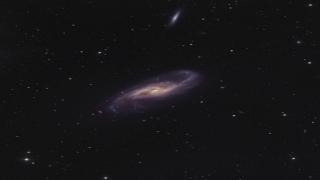Bibcode
Tan, Boon-Kok; Leech, J.; Rigopoulou, D.; Warren, B. E.; Wilson, C. D.; Attewell, D.; Azimlu, M.; Bendo, G. J.; Butner, H. M.; Brinks, E.; Chanial, P.; Clements, D. L.; Heesen, V.; Israel, F.; Knapen, J. H.; Matthews, H. E.; Mortier, A. M. J.; Mühle, S.; Sánchez-Gallego, J. R.; Tilanus, R. P. J.; Usero, A.; van der Werf, P.; Zhu, M.
Referencia bibliográfica
Monthly Notices of the Royal Astronomical Society, Volume 436, Issue 1, p.921-933
Fecha de publicación:
11
2013
Número de citas
8
Número de citas referidas
8
Descripción
We present 12CO J = 3→2 maps of NGC 2976 and NGC 3351
obtained with the James Clerk Maxwell Telescope (JCMT), both early
targets of the JCMT Nearby Galaxy Legacy Survey (NGLS). We combine the
present observations with 12CO J = 1→0 data and find
that the computed 12CO J = 3→2 to 12CO J =
1→0 line ratio (R31) agrees with values measured in
other NGLS field galaxies. We compute the MH2
value and find that it is robust against the value of R31
used. Using H I data from The H I Nearby Galaxy Survey, we find a tight
correlation between the surface density of H2 and star
formation rate density for NGC 3351 when 12CO J = 3→2
data are used. Finally, we compare the 12CO J = 3→2
intensity with the polycyclic aromatic hydrocarbon (PAH) 8 μm surface
brightness and find a good correlation in the high surface brightness
regions. We extend this study to include all 25 Spitzer Infrared Nearby
Galaxies Survey galaxies within the NGLS sample and find a tight
correlation at large spatial scales. We suggest that both PAH 8 μm
and 12CO J = 3→2 are likely to originate in regions of
active star formation.
Proyectos relacionados

Las Galaxias Espirales: Evolución y Consecuencias
Nuestro grupo pequeño esta bien conocido y respetado internacionalmente por nuestro trabajo inovativo e importante en varios aspectos de la estructura y la evolución de las galaxias espirales cercanas. Usamos principalmente observaciones en varias longitudes de onda, explotando las sinergías que nos permiten responder a las cuestiones más
Johan Hendrik
Knapen Koelstra